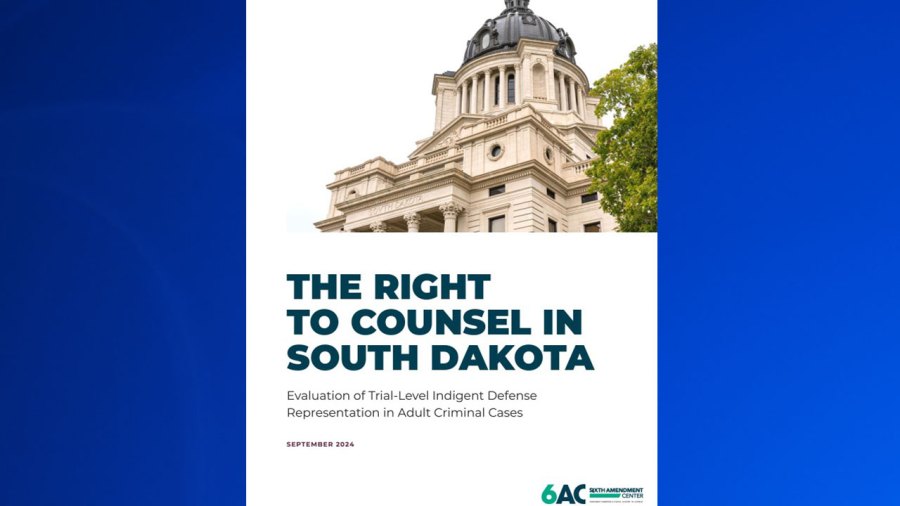PIERRE, S.D. (KELO) — An outside group’s report says there are many problems in South Dakota’s current system where county commissions must bear the costs for lawyers to defend people accused of crimes who can’t afford to hire their own legal counsel.
The Sixth Amendment Center conducted the analysis at the request of the state court administrator for the South Dakota Unified Judicial System. The 79-page report comes in the wake of the Legislature establishing a state Commission on Indigent Legal Services and establishing a state Office of Indigent Legal Services earlier this year.
The new commission recently announced the hiring of Chris Miles from the Minnehaha County Public Defender’s Office as the state’s first chief defender and the distribution of $3 million appropriated by the Legislature to counties to assist with indigent-defense expenses.
Those moves followed the Legislature’s decision a year ago to create a task force on indigent legal defense. The legislative steps came in response to requests from South Dakota Supreme Court Chief Justice Steven Jensen. In his 2024 State of the Judiciary message, the chief justice told lawmakers about the study and outlined the need.
“Judges in South Dakota continue to have difficulty finding attorneys able to provide indigent representation, particularly in rural areas,” Jensen stated. “Some counties struggle to pay indigent defense contracts and lack experienced attorneys who can handle serious felony cases. There are six counties in South Dakota that have no attorneys and 23 counties that have three or fewer lawyers. The lack of structure, oversight, and inefficiencies in our current indigent defense system has created legal deserts across the state.”
The center’s analysis found that “South Dakota’s locally funded, decentralized county-based public defense system results in the denial of counsel and erodes the adversarial system of justice” and described South Dakota as “one of four states in the nation to delegate all its trial-level right to counsel obligations to county governments, with no state oversight.”
The report calls for a significant overhaul of South Dakota’s approach and makes five recommendations:
The new commission “should promulgate standards necessary to ensure the effective assistance of counsel.”
The commission “should be funded through state annual appropriations at the level necessary
to enforce standards statewide.”
“South Dakota should consider ending its recoupment practice.” Indigent defendants currently are responsible for repaying all of their legal-defense costs.
“South Dakota should prevent prosecutors from speaking with unrepresented defendants who face the possibility of incarceration and have not waived the right to counsel.” This now often occurs at the earliest stage of proceedings.
The state court system “should adopt a uniform statewide advisement of rights.” The study found substantial differences from judge to judge in what defendants were told.
The report noted that South Dakota undertook a somewhat similar study of indigent criminal defense nearly 50 years ago, with the assistance of then-director Randolph Seiler of the state Division of Law Enforcement Assistance. Seiler would later join the federal Department of Justice as an assistant U.S. attorney in 1995 and was confirmed in 2016 as the U.S. attorney for the district of South Dakota. He passed away on April 17, 2023.
Regarding the earlier study, the new report’s authors noted, “Because the state did not make changes to the structure of the indigent defense system in response to the 1977 report, the right to counsel issues that existed nearly 50 years ago have been passed down, institutionalized, and inherited to present day.
“No single person today can, or should, be blamed for the right to counsel deficiencies detailed in this report – they predate any of today’s system actors,” the current report continued. “South Dakota’s right to counsel deficiencies are structural (not individual) and can only be remedied at the state-level, by the state.”
A news conference will be held Wednesday regarding the new report. Said Chief Justice Jensen, “We will continue to study the report in the months to come and work with the other branches of state government to ensure the right to counsel for eligible people no matter where they are in South Dakota.”


